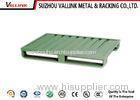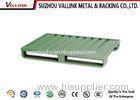

Metal Four Way Entry European Corrugated Steel Pallets Green For Stock Room
| Place of Origin: | Zhejiang |
|---|
Company Profile
| Location: | Suzhou, Jiangsu, China (Mainland) |
|---|---|
| Business Type: | Manufacturer |
| Main Products: | Warehouse Steel Shelving, Boltless Steel Shelving, Warehouse Stacking Rack |
Product Detail
| Model No.: | SV-G11 |
|---|
Product Description
Metal 4 Way Entry European Corrugated Steel Pallets Use for Stock Room
| Dimension | Region most used in | Height | Dynamic Load | Static Load | Load Capacity |
| 1219*1016mm | North America | 150mm | 2000kg | 4500kg | 1500kg |
| 1200*1000mm | Europe | 150mm | 2000kg | 4500kg | 1500kg |
| 1200*800mm | Europe | 150mm | 2000kg | 4500kg | 1500kg |
| 1140*1140mm | Australia | 150mm | 2000kg | 4500kg | 1500kg |
| 1100*1100mm | Asia | 150mm | 2000kg | 4500kg | 1500kg |
Description:
Steel pallets are strong and are used for heavy loads, high-stacking loads, long term dry storage, and loads moved by abusive logistic systems. They are often used for military ammunition. Metal pallets make up less than 1% of the market. Materials include carbon steel, stainless steel, and aluminum. Of these, carbon steel offers excellent durability at the lowest cost. Stainless steel doesn’t require a paint coating, and is preferred for such applications as clean room environments. Aluminum offers the durability of steel at a lighter weight. Carbon steel units are expensive compared to wood, and stainless and aluminum cost about 2-3 times that of carbon steel. Long term costs, however, can be lower than wood. General advantages of metal pallets are high strength and stiffness, excellent durability, bug free, no splinters, sanitary, and recyclable. Disadvantages include a higher initial price, significant weight, low friction, and susceptibility to rusting (carbon steel). Metal is primarily used in captive or closed loop environments where durability and product protection are key performance requirements. Metal units today are increasingly price competitive and lighter in weight. Primary industries that use metal pallets include automotive, pharmaceutical, lawn tractors, motorcycles, and tires.
Features and advantages:
1) Stackable for efficient storage
2) Used for heavy loads, high-stacking loads, long term dry storage, and loads moved by abusive logistic systems
3) Offers excellent durability at the lowest cost
4) More durable competitive than plastic, wood
5) High strength and stiffness, excellent durability, bug free, no splinters, sanitary, and recyclable
6) Used in industries: automotive, pharmaceutical, lawn tractors, motorcycles, and tires
7) Quality assurance, reasonable price
8) Excellent powder coating finish
About Pallet Size:
Even though we live in an increasingly global community, most of our pallet sizes are still different
for different regions of the world. For example, the 800 x 1200 EuroPallet, a standard size
throughout Western Europe for 50 years, is a rare size in the rest of the world. There are trends,
however, towards domestic and global pallet size standardization. In the 60’s and 70’s, the US
grocery industry began conversion towards the 48x40” standard footprint, and today this size is
not only standard in the grocery industry, but in many other industries as well. In 2002 the EIPS
Computer Industry Pallet Task Group recommended the 1200 x 1000 mm size as its primary
global footprint (the 800x1200 is also included). This size was selected due to its metric
dimensions, current recognition in ISO, the ability to efficiently fill most transport vehicles, and
similarity in size to the 48x40-inch US footprint (5). Previously, this industry worked with dozens
of pallet sizes and designs. It is expected that in the future, new computer industry warehouses,
distribution centers, and shipping practices will be aligned with the standard. Imagine the
efficiencies that will result for this industry over the coming decade. It is expected that these
efforts will continue in other industries due to the wholesale long term benefits throughout supply
chains that result from standardization.
More picture


